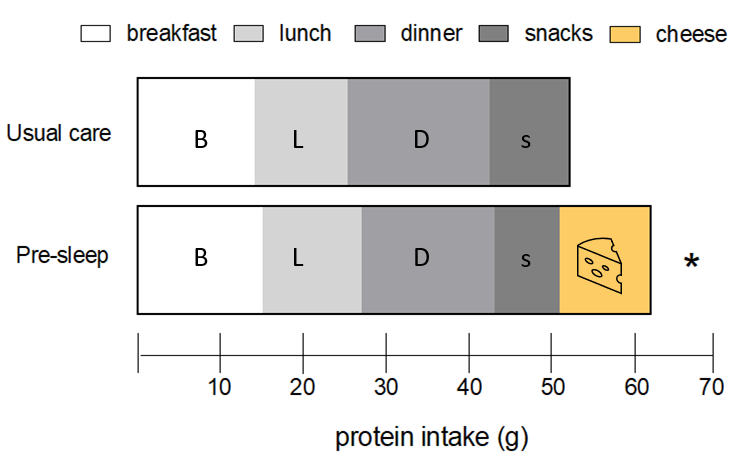Pre-sleep feeding to increase protein intake in older patients during hospitalisation
Ingesting a protein rich snack before going to sleep at night has shown to be an effective intervention strategy to increase overall protein intake in laboratory orientated research. Whether pre-sleep protein feeding, however, can increase overall daily protein intake during hospital stay is unknown. In a collaborative study between Maastricht University and FrieslandCampina, this project will evaluate whether the consumption of a daily protein rich snack before night-time sleep can increase protein and energy intake in patients admitted to the hospital for elective hip or knee surgery.
The number of older patients undergoing surgery is rapidly increasing, resulting in an increase in older adults admitted to the hospital. During hospitalisation patients are less physically active resulting in a loss of skeletal muscle mass. Furthermore, patients tend to eat less during their hospital stay, even to such a degree that a large group of patients are considered malnourished. Research has shown that malnutrition further accelerates the loss of skeletal muscle mass in hospitalised patients. Muscle mass and strength is of critical importance for post-surgery recovery, physical independence, and overall health at later stages of life. Therefore, incorporating simple strategies to improve total energy and protein intake may prove critical in patients’ ability to recover from a hospitalisation period.
There are various possible strategies to increase protein intake during hospitalisation, such as providing more protein-rich foods and/or supplements during the daily main meal moments. However, studies have shown that the amount of food that a hospitalised patient typically consumes in a single meal is limited. ‘Prior to sleep’ has been proposed to be an additional meal moment for patients to consume a protein-rich snack, in order to increase daily protein and energy intake. As such, the goal of this study was to determine whether the overall protein and energy intake will be higher during hospitalisation when patients are consuming a daily protein-rich snack prior to sleep.
Therefore, patients were randomly allocated to one of two groups: the usual care group receiving the standard nutritional plan, or the pre-sleep snack group. On top of the standard nutritional care, the pre-sleep snack group was given access to 100 g cheese cubes (30 g protein) in the evening, prior to sleep. Daily energy intake was higher in the pre-sleep snack group when compared to the usual care group. Providing patients access to a pre-sleep snack resulted in a 16% higher daily protein intake when compared to the usual care group. Protein intake at breakfast, lunch, and dinner did not differ between the pre-sleep and usual care groups; see Figure 1.
The present work shows that pre-sleep protein provision, in the form of protein dense products such as cheese, represents an effective dietary strategy to increase daily energy and protein intake in hospitalised patients. Patients provided with a pre-sleep protein snack do not compensate by lowering energy or protein intake throughout the rest of the day. Pre-sleep protein dense food provision should be implemented in hospital food logistics to improve nutritional status of our patients.

Figure 1


